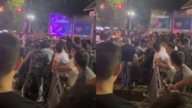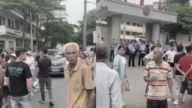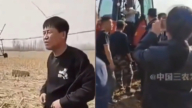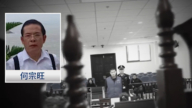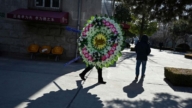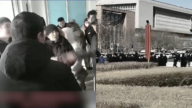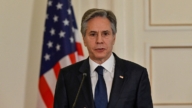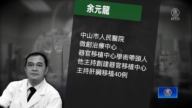【新唐人2014年01月24日訊】10年前,獲「中國十大法治人物」稱號的法律博士,現在卻被中共當局以違反所謂《遊行示威法》關押。日前,中國78名教授、律師和媒體人,集體建議對《遊行示威法》進行審查,宣佈它違憲。
10月23號,滕彪、程海、夏業良、章立凡、李大同等78名中國律師、教授和媒體人,在互聯網發表公開建議書,要求即將召開的中共人大會議,對中共《集會遊行示威法》進行違憲審查。
建議書說,《憲法》既然對公民享有基本人權和自由做出了承諾,就不能放縱違反公民權利和自由的法律法規繼續存在。而現行《集會遊行示威法》與《憲法》嚴重牴觸,實質上剝奪了公民的集會遊行示威的權利。
建議書還指出,將憲法權利設定行政許可,是《集會遊行示威法》違憲的核心所在。政府有責任保障公民的憲法權利,而不是以「拒絕批准」將一切集會遊行示威扼殺在萌芽狀態,更不能濫用公權力,將正常行使憲法權利的公民以「非法集會」、「聚眾擾亂公共場所秩序罪」等罪名構陷入獄。
24號正在開庭審理的許志永案,正是因為許志永律師與8位中國公民舉牌,而被警方以「聚眾擾亂公共秩序」的罪名刑事拘留。
10年前,許志永、滕彪等三位中國法學博士, 針對當年發生的「孫志剛事件」,發起了對《收容遣送條例》進行違憲審查的建議行動,最終迫使當局廢止了這一惡法。這三位博士也因此被評選為年度「中國十大法治人物」之一。
執筆建議書的滕彪,在接受「2003年度十大法治人物」頒獎時,《央視》主持人問﹕「法治的力量是甚麼?」他回答,「是每一個人站起來為法治而鬥爭」。不過,當時在場的人都沒有想到,幾年後,滕彪被當局註銷了律師資格證書,還遭非法拘禁多次,成了維權、異議份子、或新黑五類分子。滕彪曾經表示,他基本上成了「國家的敵人」。
中國法律學者滕彪:「《集會遊行示威法》不廢除的話,當局還會抓更多的人,我們這個建議出去,是希望《憲法》權利,不能夠被下面的法律法規任意的剝奪。」
《憲法》規定:公民有言論、出版、集會、結社、遊行、示威的自由。
不過1989年民運過後,中共製定了所謂《集會遊行示威法》,其中規定:舉行集會、遊行、示威,必須依照本法規定向主管機關提出申請並獲得許可。但是在3618個字的《集會遊行示威法》中,有14處「不得」。
1998年,中國還簽署了《公民權利和政治權利國際公約》,其中規定:「和平集會的權利應被承認,對此項權利的行使不得加以限制。」
滕彪:「《集會遊行示威法》它剝奪了公民的遊行示威權利。從條文上來看,它基本上都是限制這些條款,實踐上,從來也沒有批准過公民申請的遊行示威。」
律師們的建議書指出,《集會遊行示威法》實施近25年來,即使是三、五人訴求的遊行申請,公安局也以「將嚴重破壞社會秩序」為由,作出不許可決定。
去年10個月中,至少有100人以上,因為集會活動被逮捕入獄。
北京維權人士葉紅霞,向北京市公安局申請4天的遊行示威,當局在規定時間內,沒有出具反對禁止意見。
今年年初,葉紅霞按申請,從建國門地鐵西南角出發,沿途警車和便衣跟隨。葉紅霞順利完成一天的遊行示威活動後,被當局拘捕。
北京律師程海:「在遊行示威的兩天前,如果沒有給你答復,就視同批准了,這批准有兩種形式,一個是給你文件,一個是沒有文件。」
建議書說,中國應該像其他國家一樣,將集會遊行示威的行政審批制改成「備案制」,也就是,當集會遊行示威達到一定規模,公民「提前告知」公安部門,以便部署警力維持秩序,保障集會遊行示威的順利進行。
採訪編輯/劉惠 後製/鍾元
Demonstration Law Is Unconstitutional – Chinese Lawyers
A doctorate of law who was named one of China’s top ten
legal figures a decade ago is now imprisoned on charges
of violating of the so-called demonstration law.
Recently, 78 professors, lawyers and journalists
have collectively declared the demonstration legislature
unconstitutional and demand its re-evaluation.
On Oct. 23, 78 Chinese lawyers, professors and journalists
including Teng Biao, Cheng Hai, Xia Yeliang, Zhang Lifan,
and Li Datong created a public proposal on the web
calling for an investigation into the unconstitutional
demonstration law at the upcoming
National People’s Congress.
The proposal points out that the Constitution grants citizens
the basic human rights and freedoms;
Laws and regulations that indulge in violation
of civil rights and liberties cannot continue to exist.
The protest law is in serious violation of the Constitution
as it deprives the right of assembly and demonstration.
The proposal also points out that forcing citizens to obtain
an administrative license in order to demonstrate is at its core
unconstitutional.
The government has a responsibility to protect
the constitutional rights of its citizens rather than kill
the assembly and demonstration at its budding
by refusing to issue a permit.
In exercising the constitutional rights, government cannot
abuse public power and charge citizens with the crimes
of unlawful assembly or gathering a crowd
to disturb public order.
Xu Zhiyong’s case was precisely caused by the police
who charged attorney Xu and other Chinese citizens
who participated in the protest with gathering a crowd
to disturb public order.
10 years ago, three Chinese legal doctorates, Xu Zhiyong,
Teng Biao, and Yu Jiang proposed a re-evaluation
of the Custody and Repatriation Regulations based
on the Sun Zhigang incident.
Ultimately, they forced the authorities to repeal
this draconian law.
The three juris doctors were thus voted
on to the China’s Top Ten Legal Figures list.
During the award ceremony a CCTV host asked proposal
co-author Teng Biao, “How powerful is the rule of law?"
Teng replied, “Everyone stands up to struggle
for the rule of law."
However, no one would have imagined that a few years later,
authorities would revoke Teng Biao’s license to practice law.
He has been labeled an activist, dissident, a member of “the
new black five” and has been illegally detained many times.
Teng Biao has said that he has basically become
an enemy of the state.
Teng Biao, Chinese legal scholar: “As long as the
demonstration law exists, the authorities will continue
to make arrests.
Our proposal is regarding the Constitution – rights cannot
be deprived arbitrarily by laws or regulations."
China’s constitution provides that citizens have freedom
of speech, press, assembly, association, procession
and demonstration.
After the 1989 pro-democracy movement, the CCP came up
with the so-called demonstration law which states, “Rallies,
marches and demonstrations must receive approval
of authorities in accordance with the provisions of this Law.”
The legal document bans 14 forms of protest.
In 1998, China signed the International Covenant on Civil
and Political Rights which states, “The right of peaceful
assembly shall be recognized. No restrictions may be placed
on the exercise of this right."
Teng Biao: “The demonstration law (of 1989) has deprived
citizens of the right to protest.
The entire law was meant to place restrictions
on demonstration.
In practice, none of the demonstrations have been approved."
The lawyers’ proposal indicates that since the implementation
of the demonstration law 25 years ago, public security has
denied permission to small rallies of three or five people
in the name of “seriously disrupting public order.”
In the past 10 months, at least 100 people have been arrested
and imprisoned because of assembly.
Beijing activist Ye Hongxia applied for a four-day
demonstration permit with the Beijing Public Security Bureau.
The authorities did not reject her application
within the stipulated time frame.
Ye Hongxia then began her rally according to her application,
starting from the southwest corner of Jianguomen subway.
Police and plainclothes agents followed along.
After one day of march, authorities arrested Ye.
Cheng Hai, Beijing lawyer: “If you do not receive a reply
two days prior to the demonstration, it is deemed approved.
The approval comes in two forms, one with a document
and the other without."
The proposal put forth by the Chinese lawyers suggests
that China should follow other countries to change
the administrative examination and approval system
to a “filing system."
That means when the demonstration reaches a certain scale,
prior notice should be issued to the public security
departments which could then deploy police to maintain
order and ensure the smooth assembly and demonstration.
Interview & Edit/Liuhui Post-Production/Zhongyuan


